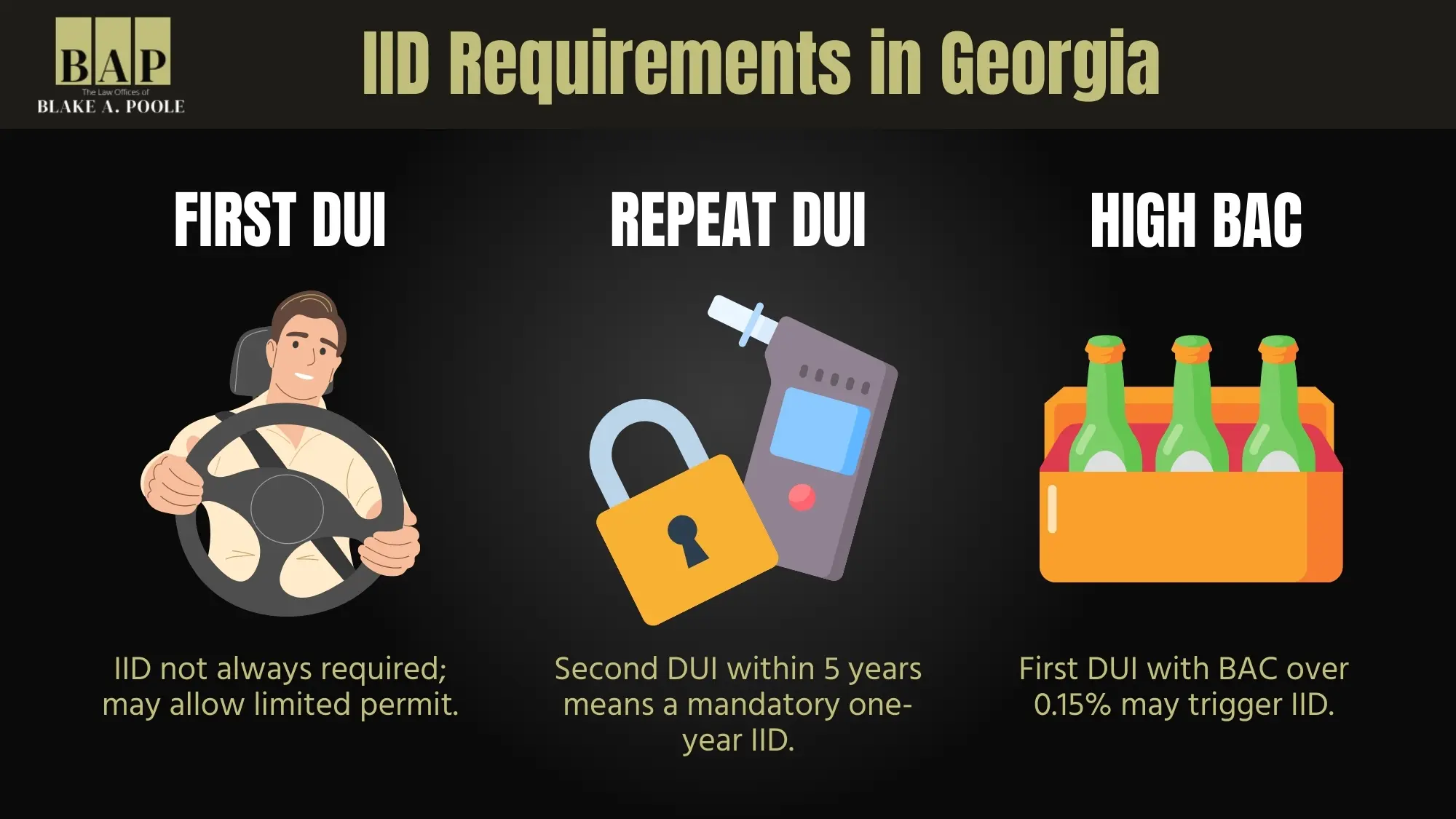August 5, 2025
By Blake A.Pool
Free Consultations
|
24/7 for Emergency Help

October 1, 2025
By Blake A. Poole
If you’re convicted of DUI in Georgia, you may be required to install an ignition interlock device (IID) in your vehicle to regain or keep limited driving privileges. Often referred to as a “car breathalyzer,” the device connects to your vehicle’s ignition system and prevents the car from starting until you provide a clean breath sample.
This article explains the ignition interlock process, when the requirement applies, what exemptions exist, and how our skilled DUI attorneys can help you protect your driving rights.

An ignition interlock device (IID) is a small breathalyzer that is wired into a motor vehicle. Here’s how an interlock device works:
The goal is to prevent drunk driving while allowing eligible drivers to keep limited or restricted driving privileges.

In Georgia, IID requirements depend on the type of DUI conviction and whether it’s your first or repeat offense (Georgia Code § 40-5-64.1).
Georgia law requires drivers to submit documentation to the Department of Driver Services (DDS) to prove compliance with IID requirements.

The process of complying with Georgia’s IID program involves several steps:
While many drivers must comply, there are situations where an IID exemption may apply:
Some states, like Washington State, California, and New Mexico, offer broader IID exemptions. Georgia law is stricter, but it does allow certain drivers to request an IID waiver.

Failing to comply with IID rules can lead to serious penalties:
In short, non-compliance can make it harder to restore your full driving rights and may extend the time you’re subject to monitoring.
The length of IID use depends on the court, the state’s requirements, and the severity of the conviction:
Your specific timeframe depends on the details of your case and your ability to remain in full compliance with the program.
The ignition interlock process is not simple. Between eligibility, exemptions, paperwork, and compliance, many drivers find the system overwhelming.
Our exceptional attorneys can help by:
Whether you need an ignition interlock device depends on your DUI conviction, prior record, and Georgia’s rules. For many drivers, it’s the only way to keep restricted driving privileges. In some cases, a medical or employer exemption may apply, but compliance is critical — missed steps or failed tests can lead to longer penalties or loss of your driver’s license.
At the Law Offices of Blake A. Poole, we protect your driving privileges and guide you through each step so you can meet Georgia's requirements and move forward with confidence. Reach out for a free consultation to discuss your options.
Alcohol can remain detectable on your breath for several hours, depending on how much you drank, your weight, metabolism, and other factors. For most people, it takes about one hour for the body to process one standard drink. However, even small amounts can trigger an ignition interlock device (IID) if your breath alcohol concentration is above the programmed limit. Using mouthwash or products with alcohol can also cause temporary failures.
The minimum IID requirement in Georgia is generally 12 months for a second DUI conviction within five years. Some first-time DUI offenders with a BAC of 0.15% or higher may also face an IID requirement, usually for 6 months. The exact timeframe depends on the details of your case and your ability to remain in full compliance with program rules.
Don't face criminal charges alone. Our experienced defense team is available 24/7 to protect your rights and fight for your future.
Our attorneys can guide you through the ignition interlock process, explain your options for exemptions, and help you protect your future.
Lorem ipsum dolor sit amet, consectetur adipiscing elit. Suspendisse varius enim in eros elementum tristique. Duis cursus, mi quis viverra ornare, eros dolor interdum nulla, ut commodo diam libero vitae erat. Aenean faucibus nibh et justo cursus id rutrum lorem imperdiet. Nunc ut sem vitae risus tristique posuere.
We begin working immediately to preserve evidence, interview witnesses, and file necessary motions. Early intervention often prevents charges from being filed or reduces their severity.
You have only 30 days to challenge your license suspension. Every day you wait makes it harder to build a strong defense. Call now!
Block Quote